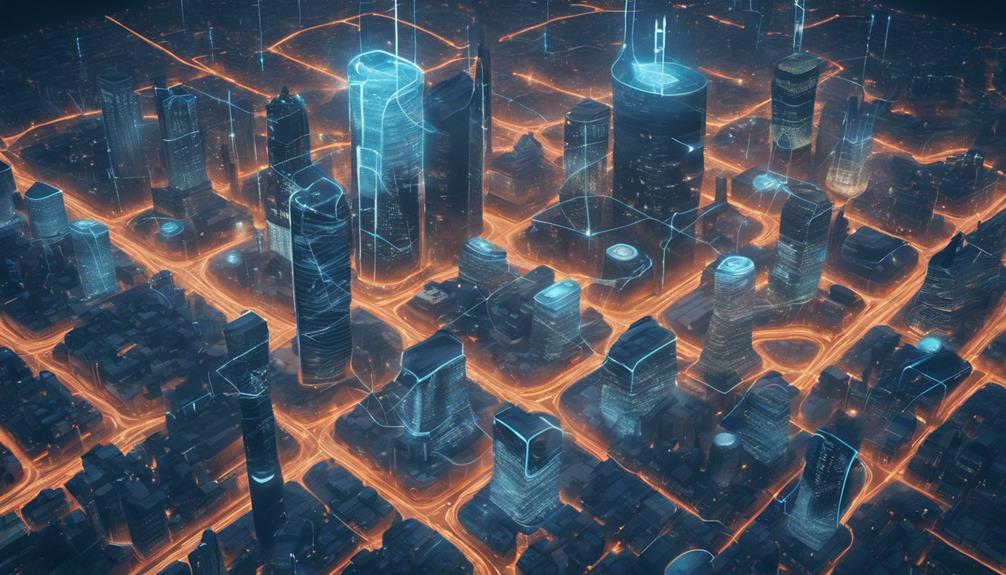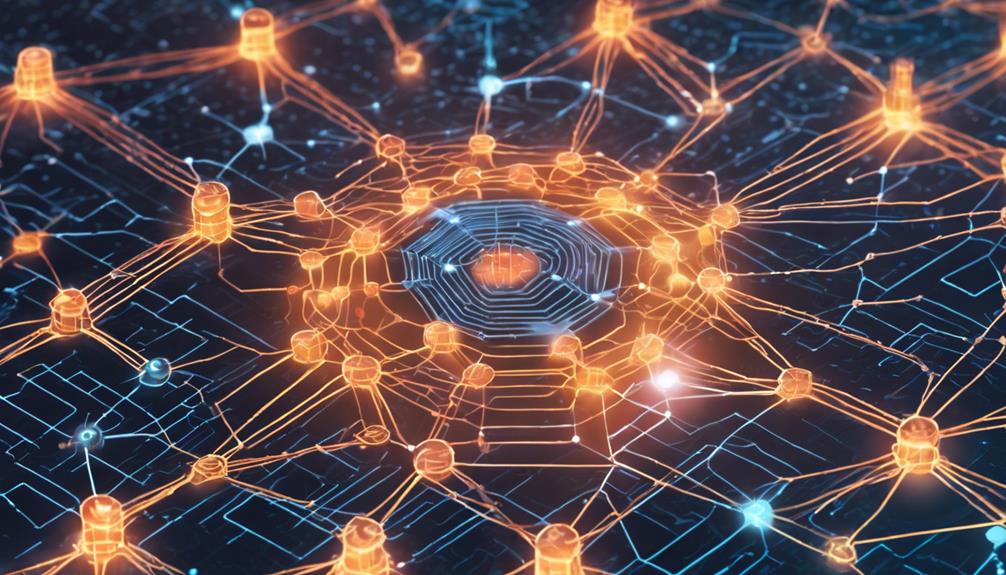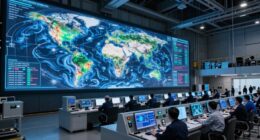As AI transforms cybersecurity, expect job roles to evolve, requiring updated skills and responsibilities. AI boosts threat detection and job efficiency, automates tasks, and fills skill gaps. However, AI lacks human judgment, emphasizing the need for human validation. Professionals must upskill in AI to adapt to these changes, as demand for AI skills in cybersecurity rises. AI both creates new job opportunities and threatens automation of routine tasks. Continuous learning and ethical AI integration are emphasized for professionals to thrive. The evolving landscape of cybersecurity jobs necessitates a proactive approach to stay relevant in this dynamic field.
Key Takeaways
- AI adoption will reshape cybersecurity roles.
- Demand for AI skills in cybersecurity will rise.
- Job market will see new opportunities and demands.
- Routine tasks may face automation threats.
- Continuous learning and upskilling are crucial for success.
AI's Advantages in Cybersecurity
In the field of cybersecurity, artificial intelligence (AI) offers a multitude of advantages, revolutionizing threat detection and serving as a reliable copilot for professionals. AI in cybersecurity has a significant impact on job efficiency, with 82% of experts foreseeing enhancements in their tasks.
By automating routine processes and analyzing vast amounts of data at incredible speeds, AI allows cybersecurity professionals to focus on more strategic and complex issues. However, there are concerns about the potential misuse of AI in cyberattacks, particularly through the creation of deepfakes and social engineering tactics.
To address these challenges, organizations must establish formal policies on the safe and ethical use of AI. Currently, only 27% of organizations have such policies in place, highlighting the urgent need for enhanced governance and regulation in this area.
Current Limitations of AI in Security
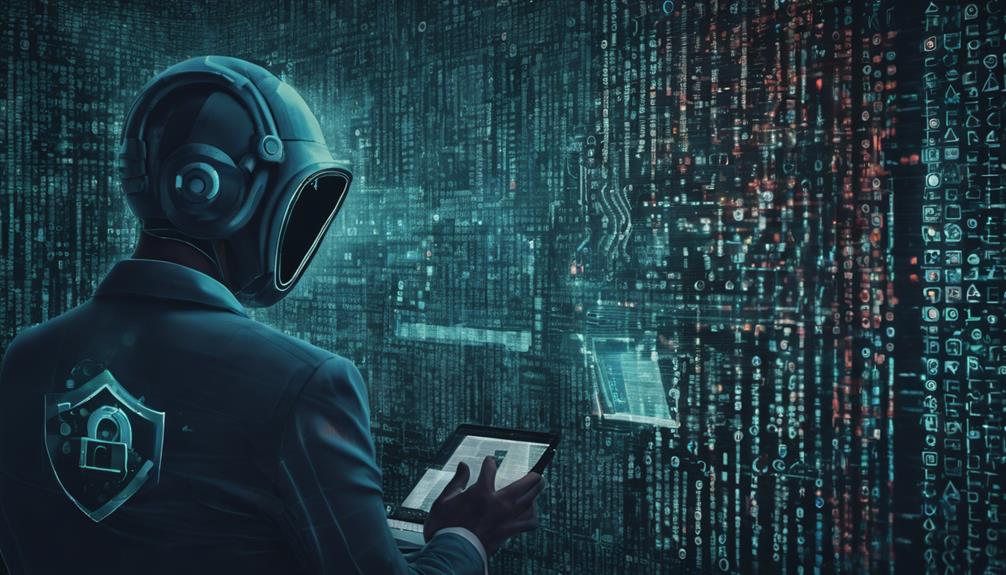
Despite the advancements in AI technology enhancing cybersecurity tasks, current limitations exist that impede its effectiveness in security measures. AI in security lacks human judgment and intuition, necessitating high-quality data for training to prevent bias.
Human validation, enhancement, and domain-specific training are essential to bolster AI's security capabilities. Professionals harbor concerns about the security and privacy of data fed into AI systems, underlining the significance of data quality and human input for continuous validation and enhancement.
To mitigate these limitations, AI systems in security must undergo careful monitoring and training to deliver accurate and unbiased results. Addressing these challenges will require a concerted effort to bridge the gap between AI capabilities and human expertise, ensuring that AI technology in cybersecurity can reach its full potential in safeguarding digital assets and systems against evolving threats.
Impact on Cybersecurity Job Market
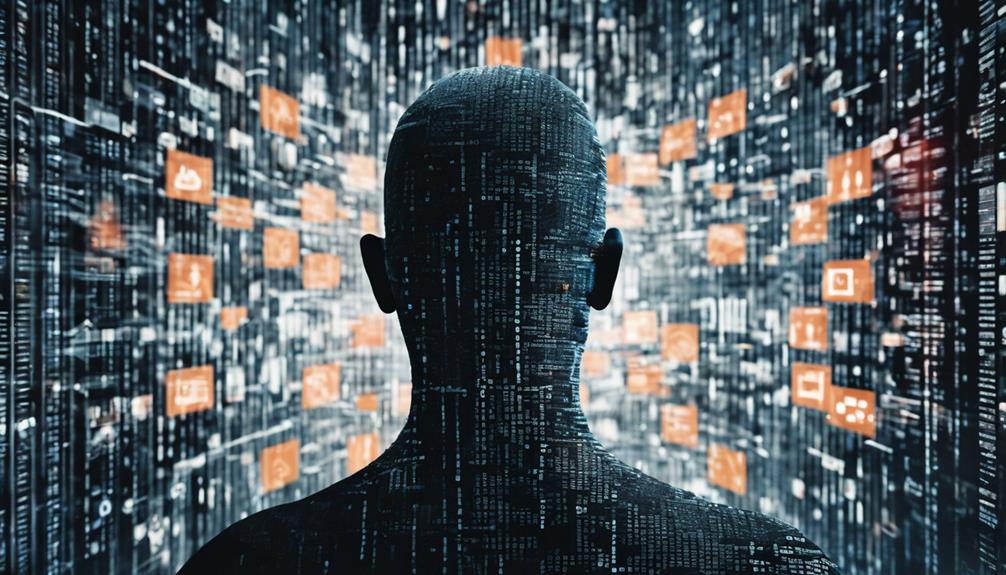
The impact of AI on the cybersecurity job market is multifaceted. Job demand is shifting, requiring professionals to evolve their skills to meet new challenges.
While automation poses threats, it also presents opportunities for cyber experts to leverage AI in enhancing their capabilities for better threat detection and response.
Job Demand Shifts
With the rapid advancements in AI technology, the landscape of cybersecurity job demand is undergoing significant shifts. The integration of AI in cybersecurity is not only enhancing the current capabilities of cyber security professionals in threat detection but also opening up new job opportunities.
As the demand for cyber security professionals continues to rise, AI is helping to fill the skills gap that has led to an expected 3.5 million unfilled cyber security jobs by 2025. AI's impact is particularly beneficial in increasing efficiency and effectiveness in handling cyber threats, making it a valuable tool for both entry-level positions and experienced professionals.
This shift in job demand towards AI-integrated roles highlights the importance of acquiring skills in AI technologies to stay competitive in the evolving cyber security job market. Embracing AI in cybersecurity jobs is not just a trend but a necessity for meeting the growing demands of the industry.
Skills Evolution Needed
As the demand for cybersecurity professionals continues to surge, the necessity for acquiring advanced skills in AI technologies becomes increasingly apparent in order to address the talent shortage and evolving landscape of cyber threats.
The cybersecurity job market is facing a significant skills gap, with an anticipated 3.5 million unfilled positions by 2025. Without prior expertise, professionals find it challenging to enter the field, highlighting the critical need for upskilling in AI tools and technology.
AI's impact on cybersecurity is undeniable, with 88% of professionals expecting significant changes in their roles due to AI in the coming years. Embracing AI tools not only enhances the capabilities of cybersecurity professionals but also paves the way for new job opportunities in the industry.
Automation Threats and Opportunities
In the ever-changing terrain of the cybersecurity job market, professionals must adapt to automation threats and opportunities posed by AI technologies. Cybersecurity professionals believe that AI is impacting their field in substantial ways.
While AI presents opportunities by creating new roles and demands for professionals, it also brings challenges as automation threatens to eliminate routine tasks. As AI continues to advance, it will greatly impact the job market, emphasizing the need for human expertise in ensuring the ethical use of AI in cybersecurity practices.
This shift underscores the evolving role of AI in the industry and highlights the lack of job security for those who do not upskill or specialize.
To navigate these changes successfully, professionals must focus on high-value tasks that require human intervention, emphasizing continuous learning and staying ahead of technological advancements to thrive in the evolving landscape of cybersecurity.
Evolution of AI in Security Roles
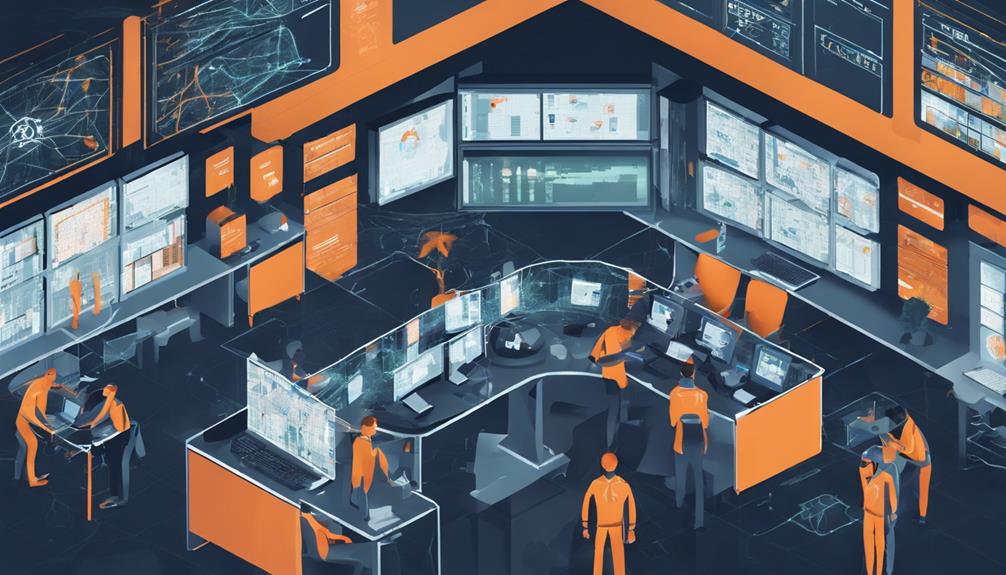
Evolving alongside the rapid advancements in technology, the integration of AI in security roles is reshaping the landscape of cybersecurity professionals' responsibilities. As AI adoption in cybersecurity accelerates, professionals are witnessing significant changes in their daily job functions.
Automation in cybersecurity is becoming more prevalent, with AI handling routine decisions to free up human experts for critical tasks. However, concerns linger about the lack of expertise and awareness within organizations regarding AI integration in security roles.
Cybersecurity jobs are now at a pivotal moment where professionals have the opportunity to lead in implementing secure technology practices through AI. The collaboration between humans and AI is evolving, emphasizing the importance of a symbiotic relationship where each complements the other's strengths.
AI for Good and Bad in Security

The increasing utilization of AI by malicious actors is dramatically impacting the landscape of cybersecurity, manifesting both beneficial and detrimental implications for security professionals. On one hand, AI tools offer defensive technologies that can analyze vast amounts of data to detect and respond to threats more efficiently.
However, malicious entities are leveraging AI to orchestrate more sophisticated cyber attacks, such as phishing campaigns powered by generative AI to craft convincing messages for social engineering. These advancements enable attackers to produce deep fakes and manipulate voices, escalating the risk of successful infiltrations.
As a result, cybersecurity professionals face the challenge of combating evolving threats that exploit AI capabilities for malicious purposes. Adapting to these changing tactics requires constant vigilance and upskilling to effectively defend against the intricate strategies employed by cybercriminals leveraging AI technology for nefarious activities.
Collaboration Vs. Displacement With AI

As AI continues to permeate the cybersecurity landscape, professionals are faced with the choice between embracing collaboration or risking displacement in the evolving field. Collaboration among cybersecurity experts is essential to harness the benefits of AI impact on cybersecurity jobs while mitigating the risks of displacement. Organizations must prioritize enhancing expertise and awareness regarding AI integration in cybersecurity to guarantee a smooth shift and secure technology implementation.
To illustrate the importance of collaboration vs. displacement with AI in cybersecurity, consider the following table:
| Collaboration Benefits | Displacement Risks |
|---|---|
| Enhanced threat detection | Job redundancies |
| Improved response times | Skill gaps in workforce |
| Efficient resource allocation | Resistance to change |
Human Interaction Needs With AI
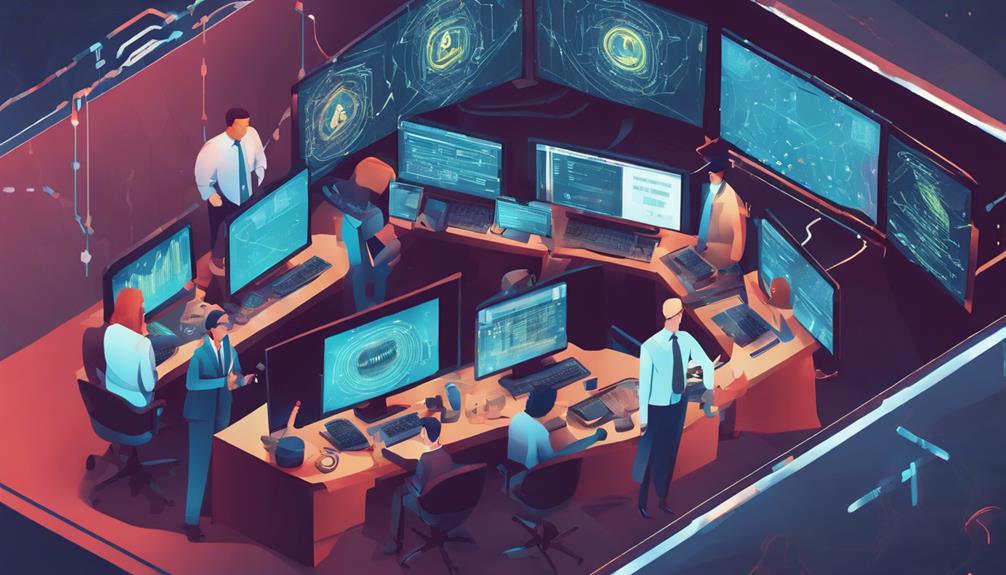
Given the increasing integration of AI in cybersecurity, maintaining effective human interaction with AI systems is essential for cybersecurity professionals to navigate the evolving landscape successfully.
To achieve this, professionals should focus on developing expertise. Continuous learning about AI technologies is vital for cybersecurity professionals to understand their impact on job roles and organizational security.
Enhancing organizational awareness is also crucial. Building a deep understanding within the organization regarding the ethical integration of AI can help in ensuring secure practices and proactive navigation of potential risks.
Moreover, promoting ethical integration is key. Encouraging the ethical use of AI technologies within cybersecurity practices can lead to a more responsible and effective approach, benefiting both professionals and organizations alike.
New Cybersecurity Job Trends
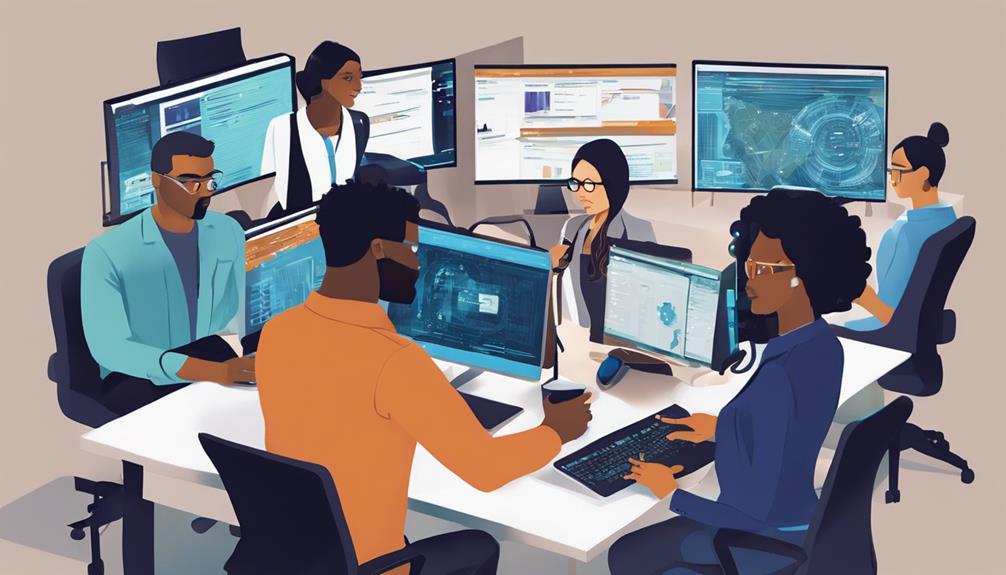
Amidst the evolving landscape of cybersecurity, emerging trends in job opportunities are reshaping the industry's workforce dynamics. With an expected 3.5 million unfilled cybersecurity jobs by 2025, the talent shortage in the industry is glaring.
One significant issue faced is the difficulty in securing entry-level positions without prior experience, exacerbating the skills gap. However, the rise of AI in cybersecurity is seen as a solution to these challenges. AI not only has the potential to fill the skills gap but also to create new job opportunities within the field.
AI adoption in cybersecurity is enhancing the capabilities of professionals, particularly in threat detection, empowering them to combat increasingly sophisticated cyber threats. As organizations integrate AI into their security operations, job growth is anticipated, opening up avenues for individuals to explore new roles and responsibilities in the cybersecurity domain.
This shift towards AI-driven cybersecurity practices is expected to offer a fresh outlook on talent acquisition and skill development, potentially bridging the gap between demand and supply in the industry.
Frequently Asked Questions
How Will AI Affect Cybersecurity Jobs?
AI is poised to revolutionize cybersecurity jobs through automation, threat detection, and response enhancements. As AI technologies evolve, professionals must adapt their skills to leverage these tools effectively, reinforcing the importance of continuous learning and upskilling.
What Is the Main Challenge of Using AI in Cybersecurity?
Amidst the evolving landscape of cybersecurity, the main challenge in utilizing AI lies in the shortage of skilled professionals adept at securing AI technologies. Addressing this expertise gap is imperative for effective AI integration in cybersecurity practices.
How Does AI Contribute to Cyber Security?
AI plays a pivotal role in cybersecurity by enhancing threat detection, incident response, threat intelligence, compliance monitoring, and improving detection quality. It acts as a reliable co-pilot for professionals, integrates with key security platforms, and offers a proactive approach to protection.
Is AI a Risk for Cyber Security?
AI presents both opportunities and risks in cybersecurity. While it enhances defense mechanisms, the misuse of AI by threat actors poses significant risks. Organizations must balance innovation with security measures to mitigate these threats effectively.
Conclusion
To sum up, the impact of AI on cybersecurity jobs is significant and rapidly changing. As AI technology continues to evolve, it offers both advantages and limitations in the field of security.
One interesting statistic to note is that by 2023, it is estimated that there will be a shortage of nearly 3 million cybersecurity professionals worldwide. This highlights the growing need for individuals to adapt to new technologies and skills to meet the demands of the ever-evolving cybersecurity landscape.



